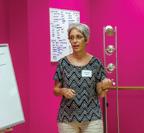
Johnson County Community College will stop offering Hebrew-language classes for college credit starting with this year’s fall semester due to budgetary constraints, low enrollment and other factors.
Orit Kamara said she’d taught the modern-Hebrew classes at JCCC since 2009, when the college started offering Hebrew for credit. She is a native Israeli, and she moved to the United States in 2001.
JCCC typically offered Elementary Hebrew I in the fall and Elementary Hebrew II in the spring. Kamara also had taught some intermediate classes for two or three years since 2009.
The class also isn’t being offered this semester, she said, because only four students enrolled, for Elementary Hebrew II. That class was canceled for last year’s spring semester for the same reason.
An average of 12 to 14 students have taken the first class in the sequence since she started teaching at JCCC, and an average of about half that number have taken the second class.
Despite low enrollment for her classes, she thinks they’re important beyond enabling students to learn modern Hebrew for college credit, she said.
“Johnson County Community College has proved to be a great place for teachers, and they want to do the best for students,” she said. “I still believe Hebrew should stay and can be made better. There is a demand, even though enrollment is down. Advertising (for the classes) isn’t good.”
Her students came from as far away as Topeka and Lawrence, she said. The University of Kansas seems to be the only other school that teaches Hebrew for college credit in or near the Kansas City area, she said, and it’s more expensive than it was at JCCC. Her students’ ages have ranged from 17 to 80.
Jewish and Christian students took her classes in roughly equal numbers since she started teaching Hebrew at the college, and two Muslim students took her classes over the years since 2009, she said.
“Not all my students were Jewish, so there was a lot of multicultural interaction,” she said. “Some have taken trips to Israel, and some have made aliyah (moved to Israel). I think, in general, JCCC will be a natural place to teach Hebrew because Overland Park is the center of the K.C. area’s Jewish community.”
JCCC also will discontinue Arabic, Portuguese, Italian and Latin, for the same reasons it will discontinue Hebrew, said Larry Reynolds, dean of the communications division, which oversees the foreign language department. The college will continue to offer Spanish, German, Chinese, French, Russian and Japanese.
“We based this decision on evaluating programs and managing resources, and on enrollment,” Reynolds said. “(Another) of the things (considered) was our accreditation. We’re accredited by the Higher Learning Commission, which is a regional accreditation agency. HLC plans to do a site visit (to evaluate the college) either in the fall of 2017 or the spring of 2018.”
Another factor is that some of JCCC’s foreign-language faculty who taught the discontinued courses didn’t have minimum qualifications defined by HLC, he said. The agency’s standard is that a teacher must have at least a master’s degree in the discipline taught, or a master’s in a different discipline and at least 18 credit hours in the discipline taught. Teachers who don’t meet the requirements will have to be replaced by others who do, which will affect the program’s budget.
“We also looked at whether the courses are transferable (to a four-year college or university),” Reynolds said, “and what high schools offer in foreign languages.”
JCCC has a relationship with a Chinese university and offers 20 scholarships for students to study there, he said. It also has an exchange program with a Russian university.
“In a perfect world, I would keep every language I could,” Reynolds said. “We just don’t have the demand for some of these languages.”
JCCC’s Continuing Education branch is planning to offer a class called “Beginning Biblical Hebrew” this fall, said Debbie Rulo, the branch’s director.
“We have done Hebrew classes over the years,” Rulo said. “The last time was in 2013. We haven’t always been able to maintain a (necessary) volume of students. We also offer Italian for travelers. What we normally do in Continuing Education is, when there’s a need in the community, we start taking a look at it to see if we might be able to offer something.”
Kamara is teaching non-credit Hebrew privately to four students, once a week, who’d taken her JCCC classes recently, and she also teaches about 35 others privately.
“I really take teaching Hebrew very seriously,” she said. “When I’m not teaching, I’m online and trying to improve as a teacher. For the past two years, I’ve been writing an e-book on Hebrew instruction that will be available on Amazon, on Kindle.”
Overland Park resident and retired lawyer Audrey Asher took Kamara’s Elementary I class in the fall semester last year, had planned to take Elementary II and now takes private lessons with Kamara.
“I grew up in the Conservative movement,” Asher said. “I was familiar with prayer-book Hebrew, but I had very sporadic exposure to modern Hebrew. I read English translations of Israeli literature, and my interest is that I could approach poetry in modern Hebrew, and I’d like to be able to read a novel.
“I’m disappointed,” she said. “I can continue learning on my own using the Internet or private lessons. (Kamara) keeps us on track. Learning a language requires discipline. I’m 75 percent lazier (because Kamara gives her private lessons once a week). The classes offer a different cultural element to the community. I think the loss is really that it was there for the larger community. Half the students weren’t Jewish, and my sense is they were learning about a part of the world they hadn’t known anything about.”



